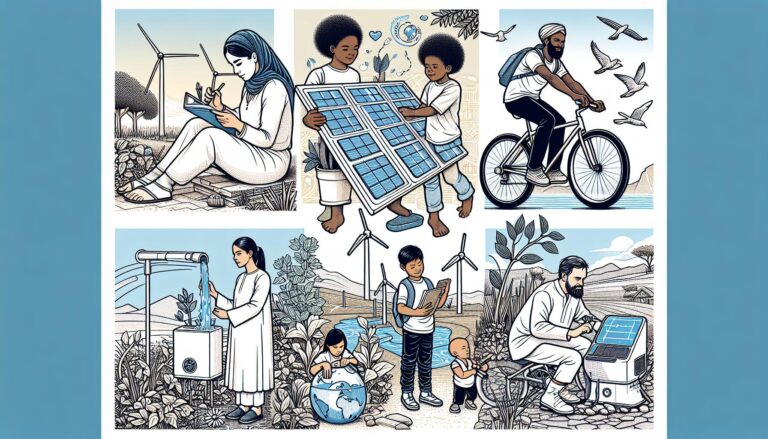As someone passionate about sustainable living, I’ve discovered the incredible impact of plant-based diets on our health and the environment. Embracing a plant-based lifestyle isn’t just about what we eat; it’s a powerful choice that can shape a more sustainable future for our planet.
I’ll delve into the benefits of plant-based diets, from reducing carbon footprints to promoting animal welfare. Join me in exploring how simple changes in our food choices can make a significant difference in creating a more sustainable and eco-friendly world. Let’s uncover the transformative power of plant-based eating together.
Benefits of Plant-Based Diets
When it comes to plant-based diets, the benefits extend far beyond personal health. Embracing this lifestyle can have a profound impact on the environment and our planet’s sustainability. Here are some key advantages of adopting a plant-based diet:
- Reduced carbon footprint: By choosing plant-based foods over animal products, I’m significantly lowering my carbon footprint. Livestock farming is a major contributor to greenhouse gas emissions, and shifting towards plants can help combat climate change.
- Supports animal welfare: Opting for plant-based options means I’m directly supporting animal welfare. The livestock industry often involves practices that raise ethical concerns, and by choosing plant-based foods, I’m taking a stand for the well-being of animals.
- Health benefits: Not only does a plant-based diet benefit the planet, but it also offers numerous health advantages. Plants are rich in essential nutrients, fiber, and antioxidants that promote overall well-being and reduce the risk of chronic diseases.
- Water conservation: Plant-based diets are more water-efficient compared to animal agriculture. Producing plant foods requires significantly less water, which is crucial for preserving this precious resource for future generations.
- Biodiversity preservation: Eating a variety of plant-based foods supports biodiversity. By consuming a diverse range of plants, I’m contributing to the preservation of different plant species and ecosystems.
- Economic efficiency: Plant-based diets can also be more economically efficient. Plant foods are often more affordable and accessible, making sustainable eating an achievable option for individuals from various backgrounds.
Making the switch to a plant-based diet not only benefits my health but also plays a crucial role in creating a more sustainable and eco-friendly future for our planet.
Reducing Carbon Footprints
Transitioning to a plant-based diet plays a crucial role in Reducing Carbon Footprints. By opting for plant foods over animal products, I significantly lower my greenhouse gas emissions. Did you know that livestock farming contributes to a substantial amount of carbon dioxide and other greenhouse gases in the atmosphere?
Here are some key points to consider:
- Livestock farming generates 14.5% of global greenhouse gas emissions, according to the United Nations.
- Producing meat requires more resources and energy compared to plant-based foods.
- Eating plant-based meals reduces emissions and helps combat climate change.
Making the shift to plant-based eating not only benefits my health but also has a positive impact on the environment.
Promoting Animal Welfare
When I shifted to a plant-based diet, I reduced my contribution to the suffering of animals raised for food. Choosing plant-based foods means supporting ethical treatment of animals and advocating for their welfare. By minimizing the demand for animal products, we can help reduce the number of animals subjected to factory farming practices.
Moreover, plant-based diets align with compassion towards all living beings. Transitioning away from animal products is a step towards creating a more humane food system that values the well-being of animals. Opting for plant-based alternatives not only benefits my health and the environment but also contributes to the ethical treatment of animals.
| 75 billion | animals slaughtered globally each year for food |
| 77% | people who choose a plant-based diet for animal welfare reasons |
| 1/3 | amount of antibiotics used in livestock that contribute to antibiotic-resistant bacteria |
Making mindful choices in our diets can have a significant impact on Promoting Animal Welfare and fostering a more compassionate relationship with the environment.
Making Sustainable Food Choices
When considering sustainable food choices, opting for plant-based diets emerges as a clear frontrunner. By prioritizing plant foods over animal products, we directly reduce environmental impacts such as greenhouse gas emissions, water usage, and deforestation caused by animal agriculture.
Plant-based diets require significantly less land, water, and energy compared to animal agriculture. Transitioning to plant-based alternatives is a powerful way to combat climate change, effectively reducing carbon footprints and our overall environmental footprint.
Choosing plant-based options over animal products is not only beneficial for the planet but also for individual health. Plant foods are rich in essential nutrients, fiber, and antioxidants that support overall well-being and vitality.
Furthermore, making sustainable food choices by embracing plant-based diets directly contributes to the preservation of biodiversity. By decreasing the demand for animal products, we can help protect habitats and wildlife populations that often suffer due to industrial agriculture practices.
In essence, individuals have the power to make a significant impact on sustainability through their daily food choices. Prioritizing plant-based diets is a compassionate and practical step towards creating a more sustainable future for both ourselves and the planet.
Transformative Power of Plant-Based Eating
Transitioning to a plant-based diet is powerful in reducing environmental impact. Plant-based diets have the potential to significantly lower greenhouse gas emissions, water usage, and deforestation associated with animal agriculture.
Embracing plant-based eating can help combat climate change by decreasing carbon footprints. The shift towards plant-based alternatives showcases a commitment to sustainability that benefits both individuals and the planet.
Plant-based diets are not only beneficial for the environment but also for personal health. They are rich in essential nutrients and antioxidants, promoting overall well-being. By choosing plant-based foods, individuals can support their health while reducing their ecological footprint.
Moreover, the transformative power of plant-based eating extends to biodiversity conservation. By reducing the demand for animal products, plant-based diets aid in the protection of habitats and wildlife populations. This dietary choice contributes to the preservation of various ecosystems and helps sustain diverse species.
Overall, the transformative power of plant-based eating lies in its ability to make a positive impact on both environmental sustainability and personal health. By adopting a plant-based diet, individuals can play a crucial role in creating a more sustainable future for themselves and the planet.
Key Takeaways
- Plant-based diets offer a range of benefits including reducing carbon footprints, supporting animal welfare, and providing health advantages.
- Transitioning to plant-based eating can help conserve water resources and support biodiversity preservation.
- Economically efficient, plant-based diets are accessible and affordable for individuals from diverse backgrounds.
- By making the switch to plant-based foods, individuals contribute to creating a more sustainable and eco-friendly future for the planet.
Conclusion
Transitioning to a plant-based diet is a powerful choice for both personal health and environmental sustainability. By reducing greenhouse gas emissions, water consumption, and deforestation associated with animal agriculture, plant-based eating offers a sustainable solution to combat climate change. Embracing plant-based foods not only nourishes the body with essential nutrients and antioxidants but also minimizes ecological footprints. Furthermore, the shift to plant-based diets plays a significant role in biodiversity conservation by lessening the demand for animal products, thus aiding in habitat and wildlife protection. Choosing a plant-based lifestyle is not just about individual health; it’s a crucial step towards building a more sustainable future for ourselves and the planet. Make a positive impact today by incorporating more plant-based options into your diet.



